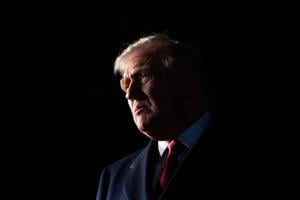World
Trump Celebrates Ceasefire Agreement Between Thailand and Cambodia

During a ceremony in Kuala Lumpur on March 3, 2024, U.S. President Donald Trump attended the signing of an expanded ceasefire agreement between Thailand and Cambodia. This agreement marks a significant step in halting skirmishes along their disputed border, which had seen renewed fighting earlier this year. The accord emerged as a response to Trump’s threats of economic pressure, which played a pivotal role in encouraging both nations to seek a resolution.
As part of the first phase of the deal, Thailand will release Cambodian prisoners, while Cambodia will withdraw heavy artillery from the border area. Regional observers are set to monitor compliance to prevent any resurgence of violence. Trump hailed the agreement, stating, “We did something that a lot of people said couldn’t be done.” Cambodian Prime Minister Hun Manet described the day as “historic,” while Thai Prime Minister Anutin Charnvirakul emphasized that the agreement lays “the building blocks for a lasting peace.”
Trump’s Diplomatic Efforts in Southeast Asia
This ceremony was Trump’s first event during his attendance at the annual summit of the Association of Southeast Asian Nations (ASEAN). The trip provides Trump with an opportunity to enhance his reputation as an international dealmaker, particularly as he navigates domestic challenges, including disputes over tariffs and a potential government shutdown.
Upon arriving in the Malaysian capital shortly before 0200 GMT, Trump participated in a cultural performance, displaying his characteristic enthusiasm by waving both an American and a Malaysian flag. He is expected to sign agreements with Malaysia concerning trade and critical minerals later in the day. The U.S. aims to diversify its supply chains to reduce reliance on China, which has restricted exports of essential components for technology manufacturing.
Trump’s engagement in ASEAN represents a shift from his previous term, during which he attended the summit only once. Defense Secretary Pete Hegseth had previously indicated a lack of familiarity with ASEAN, showcasing a different approach in the current administration. The summit offers Trump a renewed chance to position himself as a global peacemaker, particularly in light of the violent clashes between Thailand and Cambodia in July, which resulted in dozens of fatalities and displacements.
Economic Implications and Future Relations
Following the ceasefire agreement, Trump signed separate economic deals with both Cambodia and Thailand. According to Ou Virak, president of Phnom Penh’s Future Forum, “The fact that Trump was holding the tariff card was actually very, very significant.” He noted that this leverage likely prompted both nations to agree to the ceasefire. The ceremony served to place Trump in the spotlight as a champion for peace, potentially bolstering his aspirations for a Nobel Peace Prize.
Malaysian Prime Minister Anwar Ibrahim praised the agreement in his opening remarks at the summit, asserting that “reconciliation is not concession, but an act of courage.” The Thai foreign ministry spokesperson, Nikorndej Balankura, characterized the deal as a “joint declaration” that promises renewed relations between Thailand and Cambodia, although he noted that “work has just begun.”
Trump’s trip also includes discussions with Brazilian President Luiz Inácio Lula da Silva, although he will not meet with Canadian Prime Minister Mark Carney due to tensions arising from a recent advertising campaign against his tariffs. As trade relations with Canada become strained, Trump’s ongoing trade war with China remains a focal point of his travels. He expressed optimism regarding his upcoming meeting with Chinese leader Xi Jinping in South Korea, indicating a desire to reach a comprehensive agreement on various issues, including fentanyl trafficking and soybean sales.
While details regarding Trump’s agreements have been scarce, he remains confident about finalizing trade deals with Japan and South Korea during this trip. “We have deals with a lot of people and they’re very good deals,” he told reporters traveling with him.
Notably absent from the summit is Indian Prime Minister Narendra Modi, whose previously close relationship with Trump has soured recently. Trump has faced backlash for his comments about resolving conflicts between India and Pakistan, and he has also increased tariffs on India regarding its oil purchases from Russia.
As the situation develops, the implications of the ceasefire agreement and Trump’s diplomatic engagements will continue to unfold, with potential impacts on regional stability and international trade dynamics.
-

 Politics2 weeks ago
Politics2 weeks agoDallin H. Oaks Assumes Leadership of Latter-day Saints Church
-

 Sports2 weeks ago
Sports2 weeks agoSteve Kerr Supports Jonathan Kuminga After Ejection in Preseason Game
-

 Lifestyle2 weeks ago
Lifestyle2 weeks agoDua Lipa Celebrates Passing GCSE Spanish During World Tour
-

 Business2 weeks ago
Business2 weeks agoTyler Technologies Set to Reveal Q3 2025 Earnings on October 22
-

 Science2 weeks ago
Science2 weeks agoChicago’s Viral ‘Rat Hole’ Likely Created by Squirrel, Study Reveals
-

 World2 weeks ago
World2 weeks agoD’Angelo, Iconic R&B Singer, Dies at 51 After Cancer Battle
-

 Lifestyle2 weeks ago
Lifestyle2 weeks agoKelsea Ballerini Launches ‘Burn the Baggage’ Candle with Ranger Station
-

 Health2 weeks ago
Health2 weeks agoRichard Feldman Urges Ban on Menthol in Cigarettes and Vapes
-

 Health2 weeks ago
Health2 weeks agoCommunity Unites for Seventh Annual Mental Health Awareness Walk
-

 Entertainment2 weeks ago
Entertainment2 weeks agoZoe Saldana Advocates for James Cameron’s Avatar Documentary
-

 Business2 weeks ago
Business2 weeks agoMLB Qualifying Offer Jumps to $22.02 Million for 2024
-

 Entertainment2 weeks ago
Entertainment2 weeks agoNetflix’s The Hunting Wives Season 2 Set to Deliver More Twists









